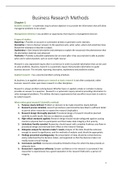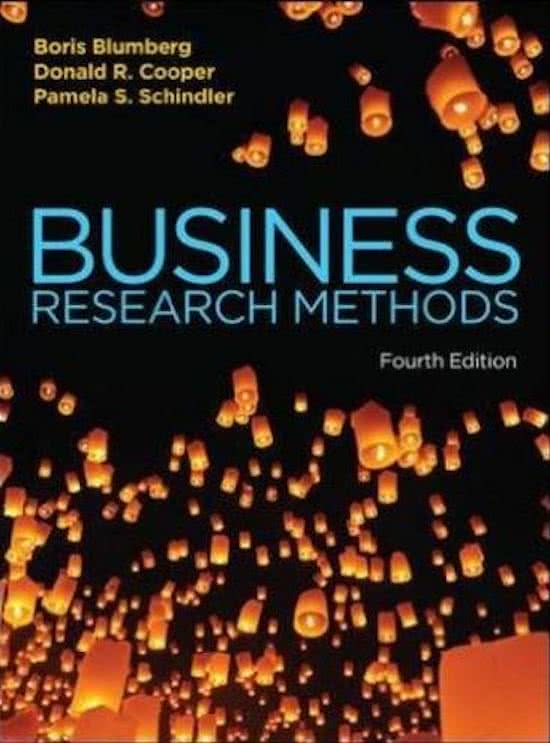Business Research Methods
Chapter 1
Business research = a systematic inquiry whose objective is to provide the information that will allow
managerial problems to be solved.
Management dilemma = any problem or opportunity that requires a management decision
4 types of studies:
Reporting = Provides an account or summation of data or generates some statistics.
Descriptive = tries to discover answers to the questions who, what, when, where and sometimes how.
Researcher attempts to describe a subject.
Explanatory = Goes beyond descriptive and attempts to explain the reasons for the phenomenon that
the descriptive study has only observed.
Predictive = Provides a plausible explanation for an event after it has occurred and is able to predict
when and in what situations such an event might reoccur.
Research is any orgnanized inquiry that is carried out in order to provide information that can be used
to solve problems. Business research is a systematic inquiry that provides information to guide
business decision. This includes reporting, descriptive, explanatory and predictive studies.
Applied research = has a practical problem-solving emphasis
As business is an applied science pure research or basic research is not often conducted, rather
business research relies upon basic research in other disciplines.
Research is always problem-solving based. Whether basic or applied, simple or complex it always
provides an answer to a question. Research is a systematic inquiry aimed at providing information to
solve managerial problems. This defines the basic requirements that any effort must meet in order to
be called research.
What makes good research? (Scientific method)
1. Purpose clearly defined; Problem or decision to be made should be clearly defined.
2. Research process detailed; research procedures used should be described in sufficient detail
to permit other researcher to repeat the research (replicable).
3. Research design thoroughly planned; Procedural design of research should be planned
carefully to yield results that are as objective as possible.
4. High ethical standards applied; Research design should include safeguards against causing
mental or physical harm to participants and that makes data integrity a first priority.
5. Limitations frankly revealed; Researcher should report with complete frankness any flaws in
procedural design and estimate their effect on the research findings.
6. Adequate analysis for decision-maker’s needs; Analysis of the data should be extensive
enough to reveal its significance, and the methods of analysis used should be appropriate.
7. Findings presented unambiguously; the presentation of data should be comprehensive,
easily understood by the decision-maker, and organized so that the decision-maker can
readily locate critical findings.
8. Conclusions justified; Conclusions should be limited to those for which the data provide an
adequate basis.
9. Researcher’s experience reflected; Greater confidence in the research is warranted if the
researcher is experienced, has a good reputation in the research field and is a person of
integrity.
1
,Research philosophies
1. Positivism;
- Social world exists externally and is viewed objectively
- Research is value-free
- Researcher is independent, taking the role of an objective analyst.
2. Interpretivism
- Social world is constructed and is given meaning subjectively by people
- Researcher is part of what is observed
- Research is driven by interest
3. Realism
Sharing principles of positivism and interpretivism.
- Believes that social sciences can rely on the research approach dominant in the natural
sciences.
- Concedes that understanding people and their behavior requires acknowledgement of
the subjectivity inherent to humans.
The position, or role, of theory in your research is directly linked to two different reasoning
approaches:
Deduction: form of inference that purports to be conclusive – that is, the conclusion must necessarily
follow from the reasons given. For a deduction to be correct, it must be both true and valid:
- Premises (reasons) given for the conclusion must agree with real world (true)
- Conclusion must necessarily follow from the premises (valid)
Induction: Does not have the same strength of relationship between reasons and conclusions. Draw
a conclusion from on e or more particular facts or pieces of evidence. The conclusion explains the
facts, and the facts support the conclusion. The nature of induction is that the conclusion is only a
hypothesis. It is one explanation, but there are others that fit the facts just as well.
Induction and deduction are used in research reasoning in a sequential manner. John Dewey
describes this process as the double movement of reflective thought.
A concept is a generally accepted collection of meanings or characteristics associated with certain
events, objects, conditions, situations and behaviors. Concepts represent progressive levels of
abstraction. An abstraction like personality is much more difficult to visualize then for example table.
Such abstract concepts are often called constructs.
2
,Confusion about the meaning of concepts can destroy a research study’s value without the
researcher or client realizing it. If words have different meaning for different parties involved, then
they will not be communicating on the same wavelength.
An operational definition is one stated in terms of specific testing or measurements criteria. These
terms must have empirical referents (must be able to count, measure or in some way gather the
information via our senses) Whether the object to be defined is physical (machine tool) or highly
abstract (achievement motivation), the definition must specify characteristics and how they are to be
observed. The specifications and procedures must be so clear that any competent person using them
would be able to classify the objects in the same way.
The term variable is used as a synonym for construct, or the property being studied. In this context
we use variable as a symbol to which we assign a numeral or value.
Dichotomous variables = have only two values, reflecting the presence or absence of a property.
(Male/female, employed/unemployed)
Continuous variables = Takes on values within a given range of an infinite set. Age, income,
temperature etc.
Independent variable (IV)= the IV causes the DV to occur. Predictor variable
Dependent variable (DV) = outcome variable. DV describes what is investigated/explained
Moderating variable (MV) = interaction variable. second independent variable that is included
Intervening variable (IVV)= mediating variable. A factor that theoretically affects the DV, but cannot
be observed or has not been measured.
Control variable (CV) = We include CVs in our investigation to ensure that our results are not biased
by not including them.
Proposition = Statement about concepts that may be judged as true or false if it refers to observable
phenomena. When a proposition is formulated for empirical testing, we call it a hypothesis.
3
, Hypothesis = is of a tentative and conjectural nature. Described as statements in which we assign
variables to cases. Case is defined as entity and hypothesis talks about this. The variable is the
characteristic in the hypothesis ascribed to the case.
Descriptive hypotheses = Propositions that typically state the existence, size, form or distribution of
some variable.
In Denmark (case), the unemployement rate (variable) stands at 5,8 cent of the labour force.
Relational hypotheses = Statements that describe a relationship between two variables with respect
to a particular case.
Foreign (variable) cars are perceived by Italian consumers (case) to be of a better quality
(variable) than domestic cars.
Explanatory (causal) hypothesis = implication that the existence of, or a change in, one variable
causes or leads to a change in the other.
An increase in family income (IV) leads to an increase in the percentage of income safed (DV)
Theory = set of systematically interrelated concepts, definitions and propositions that are advanced
to explain and predict phenomena.
Model = representation of a system that is constructed to study some aspect of that system or the
system as a whole.
- Descriptive models: describe the behavior of elements in a system where theory is
inadequate or non-existent.
- Explicative models: extend the application of well-developed theories or improve our
understanding of their key concepts.
- Simulation models: clarify the structural relationships of concepts and attempt to reveal
the process relationship among them.
4






